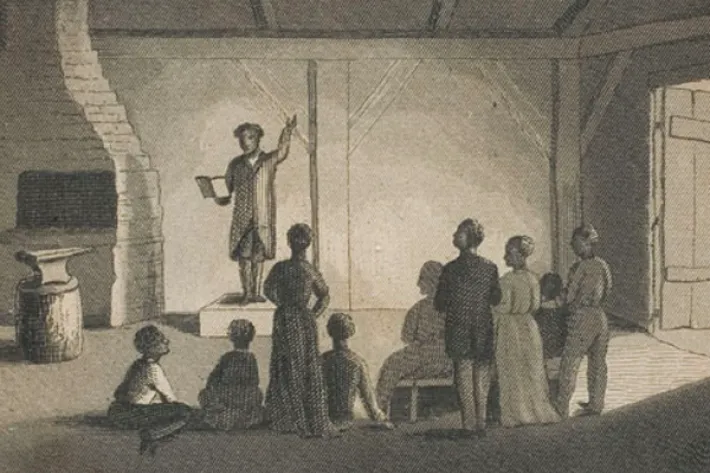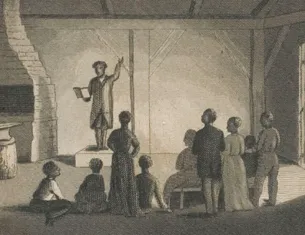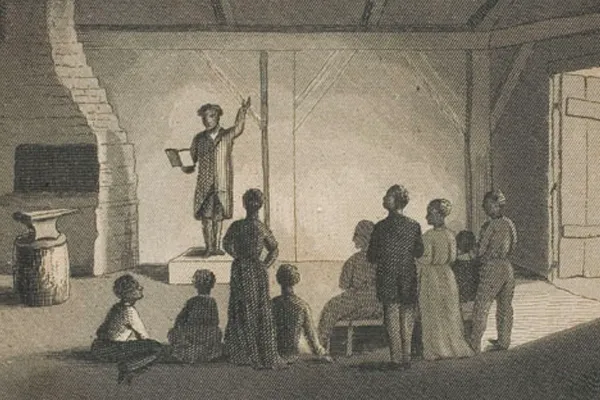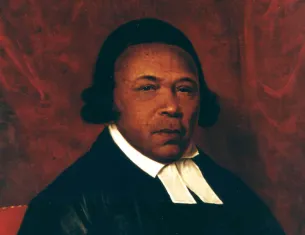An Autobiographical Account from Childhood to Manumission, 1787

Bethel African Methodist Episcopal Church, lithograph by W. L. Breton (Philadelphia, 1829). (Library Company of Philadelphia)
In this little-known autobiographical account, Jones describes his struggle as a young man to earn and save money in order to purchase his wife’s freedom and, eventually, his own.
Excerpts from Absalom Jones, Autobiographical Account, 1787
I, Absalom Jones was born in Sussex, [Delaware], on the 6th of November, 1746. I was small, when my master took me from the field to wait and attend on him in the house; and being very fond of learning, I was careful to save the pennies that were given me by the ladies and gentlemen from time to time. I soon bought myself a primer, and begged to be taught by any body that I found able and willing to give me the least instruction. Soon after this, I was able to purchase a spelling book; for as my money increased, I supplied myself with books, among others, a Testament. For, fondness for books, gave me little or no time for the amusements that took up the leisure hours of my companions. By this course I became singular, and escaped many evils, and also saved my money[.]
In the year 1762, my mother, five brothers and a sister were sold, and I was brought to the city of Philadelphia with my master. My employment in this city was to wait in the store, pack up, and carry out goods. In this situation, I had an opportunity, with the clerk, to get copies set for me; so that I was soon able to write to my mother and brothers, with my own hand. My spelling is bad for want of proper schooling.
In the year 1766, I asked my master the liberty of going one quarter to night-school, which he granted. I had a great desire to learn Arithmetic. In that quarter, I learned Addition, Troy weight, Subtraction, Apothecaries’ weight, Practical Multiplication, Practical Division, and Reduction.
In the year 1770, I married a wife, who was a slave. I soon after proposed to purchase her freedom. To this her mistress agreed, for the sum of forty pounds. Not having the money in hand, I got an appeal drawn, and John Thomas, my father-in-law, and I called upon some of the principal Friends of this city. From some we borrowed, and from others we received donations. In this way we soon raised thirty pounds of the money, her mistress, Sarah King, forgiving the balance of ten pounds. By this time, my master’s family was increased, and I was much hurried in my servitude. However, I took a house, and for seven years, made it my business to work until twelve or one o’clock at night, to assist my wife in obtaining a livelihood, and to pay the money that was borrowed to purchase her freedom. This being fully accomplished, and having a little money in hand, I made application to my master, in the year 1778, to purchase my own freedom; but, as this was not granted, I fortunately met with a small house and lot of ground, to be sold for one hundred and fifty pounds, continental money. Having laid by some hard money, I sold it for continental, and purchased the lot. My desire for freedom increased, as I knew that while I was a slave, my house and lot might be taken as the property of my master. This induced me to make many applications to him for liberty to purchase my freedom; and on the first of October, 1784, he generously gave me a manumission. I have ever since continued in his service at good wages, and I still find it my duty, both late and early, to be industrious to improve the little estate that a kind Providence has put in my hands.
Since my freedom, I have built a couple of small houses on the same lot, which now let for twenty-two pounds a year.
Source: Absalom Jones, “Narrative . . . copied from the original manuscript written by himself” (ca. 1787), printed in William Douglass, Annals of the First African Church, in the United States of America (Philadelphia, 1862), pp. 119–121.
Absalom Jones, Autobiographical Account, 1787
I, Absalom Jones was born in Sussex, [Delaware], on the 6thof November, 1746. I was small, when my master took me from the field to wait and attend on him in the house; and being very fond of learning, I was careful to save the pennies that were given me . . . from time to time. I soon bought myself a primer, and begged to be taught by any body that I found able and willing to give me the least instruction.
In the year 1770, I married a wife, who was a slave. I soon after proposed to purchase her freedom. To this her mistress agreed, for the sum of forty pounds . . . From some we borrowed, and from others we received donations. In this way we soon raised thirty pounds of the money, her mistress, Sarah King, forgiving the balance of ten pounds . . . I took a house, and for seven years, made it my business to work until twelve or one o’clock at night, to assist my wife in obtaining a livelihood, and to pay the money that was borrowed to purchase her freedom . . . I made application to my master, in the year 1778, to purchase my own freedom; but, . . . was not granted . . . My desire for freedom increased, as I knew that while I was a slave, my house and lot might be taken as the property of my master. This induced me to make many applications to him for liberty to purchase my freedom; and on the first of October, 1784, he generously gave me a manumission. I have ever since continued in his service at good wages . . .
Source: Absalom Jones, “Narrative . . . copied from the original manuscript written by himself” (ca. 1787), printed in William Douglass, Annals of the First African Church, in the United States of America (Philadelphia, 1862), pp. 119–121.
primer - a small book teaching children how to read
Background
In this little-known autobiographical account, Jones describes his struggle as a young man to earn and save money in order to purchase his wife’s freedom and, eventually, his own.
Transcript
Excerpts from Absalom Jones, Autobiographical Account, 1787
I, Absalom Jones was born in Sussex, [Delaware], on the 6th of November, 1746. I was small, when my master took me from the field to wait and attend on him in the house; and being very fond of learning, I was careful to save the pennies that were given me by the ladies and gentlemen from time to time. I soon bought myself a primer, and begged to be taught by any body that I found able and willing to give me the least instruction. Soon after this, I was able to purchase a spelling book; for as my money increased, I supplied myself with books, among others, a Testament. For, fondness for books, gave me little or no time for the amusements that took up the leisure hours of my companions. By this course I became singular, and escaped many evils, and also saved my money[.]
In the year 1762, my mother, five brothers and a sister were sold, and I was brought to the city of Philadelphia with my master. My employment in this city was to wait in the store, pack up, and carry out goods. In this situation, I had an opportunity, with the clerk, to get copies set for me; so that I was soon able to write to my mother and brothers, with my own hand. My spelling is bad for want of proper schooling.
In the year 1766, I asked my master the liberty of going one quarter to night-school, which he granted. I had a great desire to learn Arithmetic. In that quarter, I learned Addition, Troy weight, Subtraction, Apothecaries’ weight, Practical Multiplication, Practical Division, and Reduction.
In the year 1770, I married a wife, who was a slave. I soon after proposed to purchase her freedom. To this her mistress agreed, for the sum of forty pounds. Not having the money in hand, I got an appeal drawn, and John Thomas, my father-in-law, and I called upon some of the principal Friends of this city. From some we borrowed, and from others we received donations. In this way we soon raised thirty pounds of the money, her mistress, Sarah King, forgiving the balance of ten pounds. By this time, my master’s family was increased, and I was much hurried in my servitude. However, I took a house, and for seven years, made it my business to work until twelve or one o’clock at night, to assist my wife in obtaining a livelihood, and to pay the money that was borrowed to purchase her freedom. This being fully accomplished, and having a little money in hand, I made application to my master, in the year 1778, to purchase my own freedom; but, as this was not granted, I fortunately met with a small house and lot of ground, to be sold for one hundred and fifty pounds, continental money. Having laid by some hard money, I sold it for continental, and purchased the lot. My desire for freedom increased, as I knew that while I was a slave, my house and lot might be taken as the property of my master. This induced me to make many applications to him for liberty to purchase my freedom; and on the first of October, 1784, he generously gave me a manumission. I have ever since continued in his service at good wages, and I still find it my duty, both late and early, to be industrious to improve the little estate that a kind Providence has put in my hands.
Since my freedom, I have built a couple of small houses on the same lot, which now let for twenty-two pounds a year.
Source: Absalom Jones, “Narrative . . . copied from the original manuscript written by himself” (ca. 1787), printed in William Douglass, Annals of the First African Church, in the United States of America (Philadelphia, 1862), pp. 119–121.
Excerpt
Absalom Jones, Autobiographical Account, 1787
I, Absalom Jones was born in Sussex, [Delaware], on the 6thof November, 1746. I was small, when my master took me from the field to wait and attend on him in the house; and being very fond of learning, I was careful to save the pennies that were given me . . . from time to time. I soon bought myself a primer, and begged to be taught by any body that I found able and willing to give me the least instruction.
In the year 1770, I married a wife, who was a slave. I soon after proposed to purchase her freedom. To this her mistress agreed, for the sum of forty pounds . . . From some we borrowed, and from others we received donations. In this way we soon raised thirty pounds of the money, her mistress, Sarah King, forgiving the balance of ten pounds . . . I took a house, and for seven years, made it my business to work until twelve or one o’clock at night, to assist my wife in obtaining a livelihood, and to pay the money that was borrowed to purchase her freedom . . . I made application to my master, in the year 1778, to purchase my own freedom; but, . . . was not granted . . . My desire for freedom increased, as I knew that while I was a slave, my house and lot might be taken as the property of my master. This induced me to make many applications to him for liberty to purchase my freedom; and on the first of October, 1784, he generously gave me a manumission. I have ever since continued in his service at good wages . . .
Source: Absalom Jones, “Narrative . . . copied from the original manuscript written by himself” (ca. 1787), printed in William Douglass, Annals of the First African Church, in the United States of America (Philadelphia, 1862), pp. 119–121.
primer - a small book teaching children how to read


